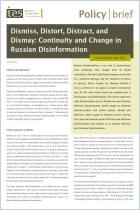Join getAbstract to access the summary!

Join getAbstract to access the summary!
Daniel L. Byman, Chongyang Gao, Chris Meserole and V. S. Subrahmanian
Deepfakes and International Conflict
Brookings Institution, 2023
What's inside?
Technology makes disinformation – a staple of geopolitics and war – harder to detect and defend against.
Recommendation
Long used in military and geopolitical engagements, disinformation campaigns are today vastly more complex, thanks to artificial intelligence, machine learning and sophisticated technologies. Writing for the Brookings Institution, four foreign policy and computer science scholars explore the architecture of “deepfakes” and assess how technology is transforming the practice of adversarial messaging and deceptive intelligence. Anyone interested in a robust examination of geopolitics in an AI world will discover some important insights in this illuminating report.
Summary
About the Authors
Daniel L. Byman is a professor at Georgetown University and a senior fellow at the Brookings Institution, where Chris Meserole is a foreign policy fellow. Chongyang Gao is a PhD student in computer science at Northwestern University, where V.S. Subrahmanian is a professor of computer science.



















Comment on this summary